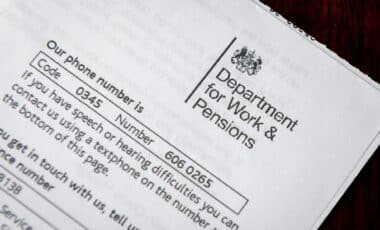On 20 December 2024, the Department for Work and Pensions (DWP) warned that thousands of claimants could lose vital financial support of £416 per month due to changes in the work capability and work-related activity (LCWRA) assessment. Recent figures reveal that around 14.6% of new claims are now considered “at substantial risk,” which equates to approximately 5,300 individuals who may lose this essential benefit.
Impact of Changes to the LCWRA Assessment
The LCWRA category within Universal Credit includes individuals who are unable to work or participate in work-related activities due to health conditions or disabilities. Those eligible for this category receive an additional £416.19 per month, on top of their standard Universal Credit payment. However, recent changes to the assessment process now put many claimants’ eligibility for this extra support in jeopardy.
Key Figures of the Assessment and Financial Impact
Here are some key numbers related to the work capability assessment and its financial implications :
- In August 2024, 36,625 decisions were made that resulted in claimants being awarded LCWRA status, meaning many are currently receiving the £416.19 supplement.
- 14.6% of new claims are now considered “at substantial risk,” which could lead to 5,300 people losing this additional financial support.
- The £416.19 monthly supplement is a crucial financial lifeline for many claimants. For some, it makes up a significant portion of their monthly income.
- Couples where one partner already receives an LCWRA payment are not eligible for a second payment, even if the other partner meets the criteria for LCWRA.
In total, there are around 2.6 million people receiving Universal Credit, but only a fraction of them are in the LCWRA category. The changes impacting this group could have serious consequences for many, as the extra £416.19 helps cover living costs and other essential expenses.
DWP’s Position on Changes to the System
The DWP has acknowledged that the current system for assessing work capability is not working effectively and has announced plans for reform. A DWP spokesperson stated: “We’ve been clear the work capability assessment is not working.” The department has pledged to release a green paper in spring 2025, outlining proposed reforms to improve the system and better support disabled individuals.
Proposed Changes and Expected Reforms
While details of the green paper are not yet available, several key areas are expected to be addressed, including :
- Review of the work capability assessment: Adjustments may be made to how claimants are assessed, with a focus on improving fairness and accuracy.
- Support for disabled claimants: The green paper may propose new measures to help disabled individuals return to work or ensure they receive adequate financial support.
- Reduction of the benefits bill: The DWP will likely explore ways to reduce overall expenditure on benefits while ensuring disabled individuals continue to receive the assistance they need.
Claimants at Risk : Consequences and Reactions
Claimants facing the risk of losing their £416.19 per month are now left with increased uncertainty. The changes in assessment rules and the re-evaluation of claims have raised concerns about the financial stability of vulnerable individuals.
Although the DWP has announced plans for reform, questions remain about how these changes will be implemented and whether they will effectively improve the situation for claimants.
Additional Considerations
- The total annual expenditure on Universal Credit is expected to exceed £70 billion in 2025, with a significant proportion allocated to individuals in the LCWRA category. Changes affecting this group could, therefore, have wider financial implications for the welfare system.
- The impact of these changes on different demographics, such as older claimants or those with long-term disabilities, is also a key area of concern. Historically, people in this group have faced greater barriers to returning to work, and many rely heavily on the LCWRA supplement for financial stability.
The situation facing many LCWRA claimants highlights the importance of ensuring that any reforms genuinely address the needs of disabled individuals while maintaining fairness in the benefits system. With 5,300 people at risk of losing £416.19 each month, these changes could have lasting financial consequences for those affected.









